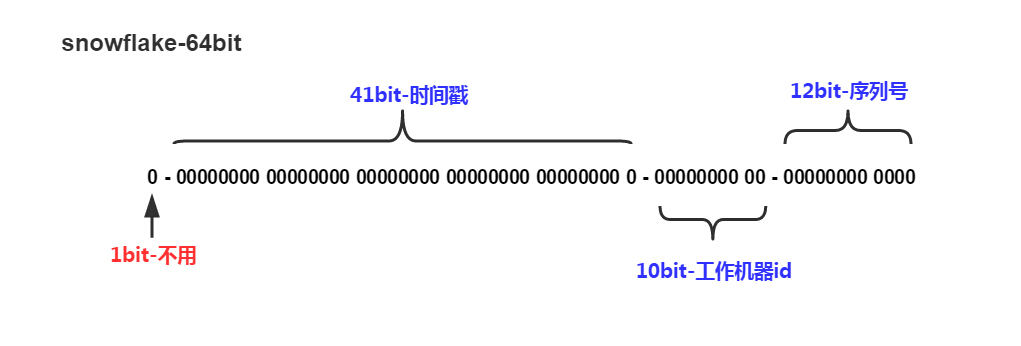Twitter-Snowflake算法产生的背景相当简单,为了满足Twitter每秒上万条消息的请求,每条消息都必须分配一条唯一的id,这些id还需要一些大致的顺序(方便客户端排序),并且在分布式系统中不同机器产生的id必须不同。
snowflake把时间戳,工作机器id,序列号组合在一起。
除了最高位bit标记为不可用以外,其余三组bit占位均可浮动,看具体的业务需求而定。以下关于此算法的可行性研究
Console.WriteLine("41bit的时间戳可以支持该算法使用年限:{0}", (1L << 41) / (3600L * 24 * 365 * 1000.0));
Console.WriteLine("10bit的工作机器id数量:{0}", (1L << 10) - 1);
Console.WriteLine("12bit序列id数量:{0}", (1L << 12) - 1);
运行结果:
41bit的时间戳可以支持该算法使用年限:69.7305700010147 10bit的工作机器id数量:1023 12bit序列id数量:4095
默认情况下41bit的时间戳(从当前开始计算)可以支持该算法使用近70年,10bit的工作机器id可以支持1023台机器,序列号支持1毫秒产生4095个自增序列id。那么理论上,一个应用1秒钟可以产生409万条自增ID,此算法可持续使用近70年。完全能满足我们日常开发项目的需求。
工作机器id严格意义上来说这个bit段的使用可以是进程级,机器级的话你可以使用MAC地址来唯一标示工作机器,工作进程级可以使用IP+Path来区分工作进程。如果工作机器比较少,可以使用配置文件来设置这个id是一个不错的选择,如果机器过多配置文件的维护是一个灾难性的事情。这个工作机器id的bit段也可以进一步拆分,比如用前5个bit标记workerid,后5个bit标记datacenterid,具体代码如下:
class Snowflake
{
//工作机器id的bit段拆分为前5个bit标记workerid,后5个bit标记datacenterid
const int WorkerIdBits = 5;
const int DatacenterIdBits = 5;
//序列号bit数
const int SequenceBits = 12;
//最大编号限制
const long MaxWorkerId = -1L ^ (-1L << WorkerIdBits);
const long MaxDatacenterId = -1L ^ (-1L << DatacenterIdBits);
private const long SequenceMask = -1L ^ (-1L << SequenceBits);
//位左运算移动量
public const int WorkerIdShift = SequenceBits;
public const int DatacenterIdShift = SequenceBits + WorkerIdBits;
public const int TimestampLeftShift = SequenceBits + WorkerIdBits + DatacenterIdBits;
//序列号记录
private long _sequence = 0L;
//时间戳记录
private long _lastTimestamp = -1L;
public long WorkerId { get; protected set; }
public long DatacenterId { get; protected set; }
public Snowflake(long workerId, long datacenterId, long sequence = 0L)
{
WorkerId = workerId;
DatacenterId = datacenterId;
_sequence = sequence;
// sanity check for workerId
if (workerId > MaxWorkerId || workerId < 0)
{
throw new ArgumentException( String.Format("worker Id can't be greater than {0} or less than 0", MaxWorkerId) );
}
if (datacenterId > MaxDatacenterId || datacenterId < 0)
{
throw new ArgumentException( String.Format("datacenter Id can't be greater than {0} or less than 0", MaxDatacenterId));
}
}
/// <summary>
/// 格林时间戳
/// </summary>
/// <returns></returns>
public long TimeGen()
{
DateTime Jan1st1970 = new DateTime(1970, 1, 1, 0, 0, 0, DateTimeKind.Utc);//
return (long)(DateTime.UtcNow - Jan1st1970).TotalMilliseconds;
}
readonly object _lock = new Object();
public virtual long NextId()
{
lock (_lock)
{
var timestamp = TimeGen();
if (timestamp < _lastTimestamp)
{
throw new InvalidSystemClock(String.Format(
"发现最新时间戳少{0}毫秒的异常", _lastTimestamp - timestamp));
}
if (_lastTimestamp == timestamp)
{
_sequence = (_sequence + 1) & SequenceMask;
if (_sequence == 0)
{
//序列号超过限制,重新取时间戳
timestamp = TilNextMillis(_lastTimestamp);
}
}
else
{
_sequence = 0;
}
_lastTimestamp = timestamp;
//snowflake算法
var id = (timestamp << TimestampLeftShift) |
(DatacenterId << DatacenterIdShift) |
(WorkerId << WorkerIdShift) | _sequence;
return id;
}
}
/// <summary>
/// 重新取时间戳
/// </summary>
protected virtual long TilNextMillis(long lastTimestamp)
{
var timestamp = TimeGen();
while (timestamp <= lastTimestamp)
{
//新的时间戳要大于旧的时间戳,才算作有效时间戳
timestamp = TimeGen();
}
return timestamp;
}
}

